Begegnungen19_0Tartalom
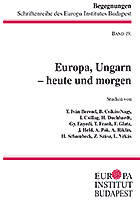 Begegnungen
Begegnungen
Schriftenreihe des Europa Institutes Budapest
Band 19.
Europa, Ungarn – heute und morgen
Herausgeben von
Ferenc GLATZ
Budapest 2003
Europa Institut Budapest
In Zusammenarbeit mit dem Zentrum für Sozialforschung
der Ungarischen Akademie der Wissenschaften
ISBN 963 210 636 9
ISSN 1416 3055
INHALT
Begegnungen18_0Tartalom
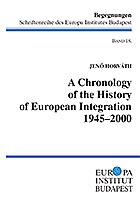 Begegnungen
Begegnungen
Schriftenreihe des Europa Institutes Budapest
Band 18.
Jenő Horváth
A Chronology of the History of European Integration
1945–2000
Edited and preface written by
Ferenc GLATZ
Budapest 2003
Europa Institut Budapest
Translated by Vera GÁTHY
Proof-read by Joseph HELD
This book was prepared in cooperation with and supported by
the Research Group on European History of the Hungarian Academy of Sciences
The publication was financially supported by
the Pro Renovanda Cultura Hungariae Foundation
ISBN 963 21063 5 0
ISSN 1416 3055
CONTENTS
|
Preface: On the Sense of the European Union (Ferenc Glatz) |
7 |
|
I. THE FIRST STEPS (1945–1949) |
|
|
II. THE EUROPE OF THE SIX (1950–1972) |
|
|
III. THE EUROPE OF THE NINE (1973–1980) |
|
|
IV. THE EUROPE OF THE TEN (1981–1985) |
|
|
V. THE EUROPE OF THE TWELVE (1986–1994) |
|
|
VI. THE EUROPE OF THE FIFTEEN (1995–2000) |
|
|
Index (Éva Kovács) |
301 |
Begegnungen17-II_0Tartalom
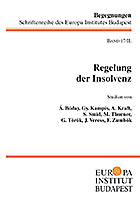 Begegnungen
Begegnungen
Schriftenreihe des Europa Institutes Budapest
Band 17/II.
Regelung der Insolvenz
Entwurf zu einem neuen ungarischen Gesetz
Redakteure
Gábor TÖRÖK
Ferenc Henrik GLATZ
Budapest 2002
Europa Institut Budapest
Übersetzt von
Balázs Ille
Mit freundlicher Unterstützung
von der Stiftung Aktion Österreich-Ungarn
ISBN
ISSN 1416 3055
INHALT
Begegnungen17-I_0Tartalom
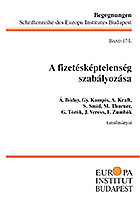 Begegnungen
Begegnungen
Schriftenreihe des Europa Institutes Budapest
Band 17/I.
A fizetésképtelenség szabályozása
Javaslat egy magyar EU-konform törvény megalkotására
Szerkesztők
TÖRÖK Gábor
GLATZ Ferenc Henrik
Budapest 2002
Europa Institut Budapest
Fordította
Ille Balázs
A kötet megjelenését a Center of Legal Competence (Wien Austria)
a Magyar Bankszövetség és az Aktion Österreich-Ungarn Alapítvány támogatta.
ISBN
ISSN 1416 3055
TARTALOM
Begegnungen16_0Tartalom
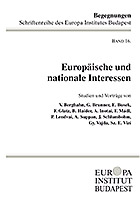 Begegnungen
Begegnungen
Schriftenreihe des Europa Institutes Budapest
Band 16.
Europäische und nationale Interessen
Herausgegeben von
Ferenc GLATZ
Budapest 2002
Europa Institut Budapest
ISBN 963 20277 4 4
ISSN 1416 3055
INHALT